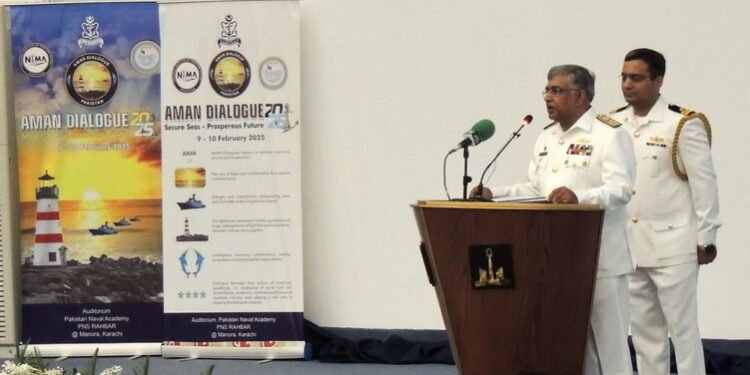
With a surge in maritime insecurity, and increasing regional tensions, the Pakistan Navy is urging international cooperation and partnerships at multinational naval exercise Aman 2025, which is seeing 60 nations take part under the slogan of ‘Together for Peace.’
Speaking on Sunday 9 February at the launch of the inaugural Aman Dialogue, hosted in conjunction with the exercise at Pakistan’s Naval Academy in Karachi, Admiral Naveed Ashraf, Chief of Naval Staff, said there is a need to engage in discussions with regional and extra-regional stakeholders to arrive at a shared understanding and a collective approach to maritime security in the region.
Exercise Aman, conceived in 2007, has blossomed from regional collaboration to a steady yoke of maritime security uniting sixty nations this year, Ashraf said, while the Dialogue aims to unite global leaders and experts to translate strategic insight and perspective into actionable solutions.
His vision for the Indian Ocean region, he told the Dialogue audience, is not an area of competition but a common area of cooperation. “The magnitude and diversity of evolving threats and challenges are such that no country can tackle them alone. Collaborative maritime security is imperative especially in regions like ours with dense economic activity and diverse stakeholders,” he said.
Uplifting the blue economy and ensuring unhindered access to the arteries of trade is “a shared responsibility for all of us,” he added.
The Aman Dialogue holds unique significance in that it seeks to transcend regional values and act as bridge between East and West, Ashraf stated. This is seeing a diverse mix of nations attend the 2025 edition, including China, Iran, the United States, Australia and many others, including a dozen African nations.
Senator Mushahid Hussain Syed emphasised that this edition of Aman is the biggest international maritime conference in the history of Pakistan, with participants from Australia to Zimbabwe, Rwanda to Fiji.
“I’m happy that landlocked countries like Zimbabwe and Rwanda are part of this,” Syed said, as “we want to land link countries”. He said it is time for a new partnership between Pakistan, Africa and the Arabian Sea for the development of the blue economy including the island states and coastal regions.
“Oceans are not just waterways,” Syed stated. “They are a tapestry of linkages, fusion, that bring together countries and cultures.” As such, Pakistan’s role is envisaged as forging cooperation and building bridges between East and West. The oceans should be a zone of peace and connectivity “and not a new arena of conflict or big power competition or a new kind of a cold war,” he continued. “Pakistan wants to be part of this emerging better peaceful and prosperous tomorrow based on connectivity, cooperation, commerce.”
Pakistan’s Defence Minister, Khawaja Muhammad Asif, told the Dialogue that in this era of globalisation and interconnectivity, national interests are best served by fostering the peaceful system of interconnected networks of trade, finance and communication. “The global economic system is almost wholly dependent on unhindered activity in the maritime domain,” he emphasised, needing countries to synchronise efforts and resources to extract greater gains while combatting rising challenges.
The world is being transformed through an era of unprecedented change, with great power competitions stirring up challenges to existing political and economic structures leading to an action-reaction conflict chain, Asif said. Global crises like climate change and pandemics have left the international order in disarray, he said, while non-conventional threats like drug trafficking, gun running, human smuggling, terrorism, and piracy threaten maritime security.
Another emerging trend is the effective use of low-cost unmanned vehicles to target shipping, with a growing threat from non-state actors. This is part of a complex web of challenges from piracy and transnational crime to environmental degradation and climate change impacts – which “recognise no borders and respect no sovereignty.”
This makes it obligatory to sit together, discuss challenges, and formulate strategies for the common good, Asif said, through initiatives like the Aman Dialogue. “The opportunities and tremendous benefits at sea cannot be harnessed if we are not aptly geared against rising challenges.”
Exercise Aman 2025 comes on the back of Pakistan assuming command of Combined Maritime Forces’ Combined Task Force 151 in late January – the eleventh time in command of the multinational CTF-151, which aims to counter piracy and other maritime threats. This, Syed said, shows Pakistan as a hub of regional connectivity and maritime security.
Guy Martin is attending Exercise Aman as a guest of the Pakistan Navy.










